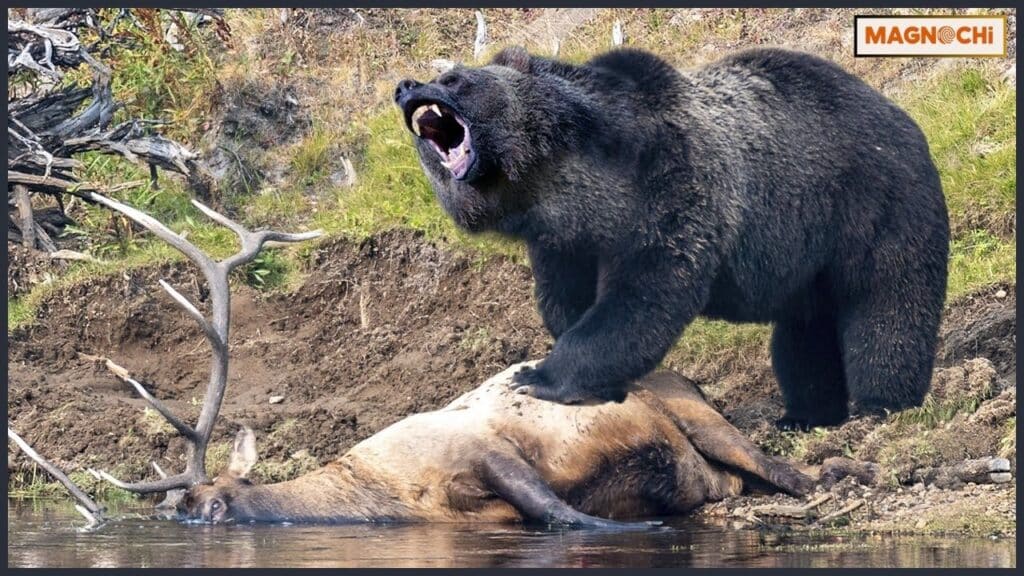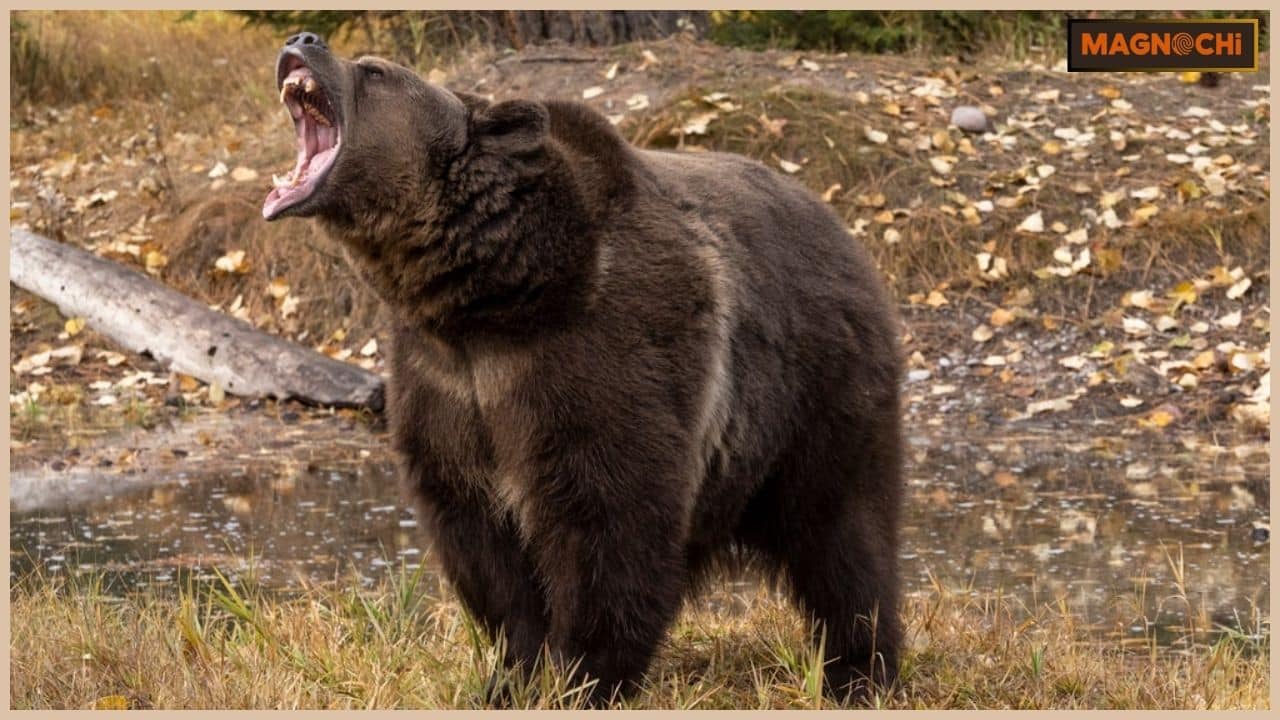Do Black Bears Attack Humans? When most people think of wildlife in North America, few creatures inspire as much awe and fear as the black bear (Ursus americanus).
Their powerful physiques, sharp claws, and presence in remote forests are both fascinating and intimidating. But does the black bear pose a real threat to humans? Are these magnificent creatures likely to attack, or is it just a myth perpetuated by sensational media coverage?
In this comprehensive article, we’ll dive deep into the truth about black bears, their behavior, and whether they pose a danger to humans.
By understanding bear behavior, the reasons behind attacks, and the safety measures you can take, you’ll gain a full understanding of how to avoid danger while appreciating these powerful creatures.
Who Are Black Bears?
Appearance and Habitat
Black bears are the most common bear species in North America. They can be found throughout Canada, the United States, and Mexico, although their populations are most dense in Eastern North America and the Pacific Northwest.
Their habitat ranges from dense forests, swamps, and mountain regions to suburban areas. Black bears are highly adaptable and can thrive in a variety of environments as long as there’s access to food and cover.
Adult male black bears generally weigh between 150 to 600 pounds, while females typically range from 100 to 300 pounds.
Their fur color varies widely from jet black to brown, cinnamon, or even blonde. This variation is why the name “black bear” can be misleading, as the species doesn’t always display the expected color.
Black bears are also known for their sharp claws and powerful jaws, which are primarily used for foraging and self-defense, not hunting large prey.
However, despite their relatively modest size compared to other bears, such as grizzly bears, black bears can still be highly dangerous when they feel threatened.
Behavior and Diet
Black bears are omnivores, which means they eat a variety of plant-based foods like fruits, nuts, seeds, and berries, as well as insects, small mammals, and the occasional carcass.
During the fall, black bears enter a period of hyperphagia, where they eat enormous quantities of food to build up fat stores for the winter months.
This behavior makes black bears particularly prone to seeking out human food, especially when they live near campsites, garbage dumps, or homes with accessible food.
Black bears are solitary creatures, unlike grizzly bears, which tend to be more territorial and social. Bears are typically nocturnal, meaning they are most active at night or during the twilight hours of dawn and dusk.
Their keen sense of smell allows them to detect food from miles away, making them especially dangerous around campsites, picnic areas, or homes with open garbage.
Although black bears are generally shy and avoid human interaction, their behavior can change in certain situations, such as during food scarcity, when they may become more aggressive or willing to enter human habitats.
Do Black Bears Attack Humans?
Frequency of Black Bear Attacks
One of the most important questions when it comes to black bear safety is: How often do these bears actually attack humans?
The short answer is: black bear attacks are rare. According to Dr. Stephen Herrero, a leading bear expert, there have been less than 100 fatal black bear attacks on humans over the past 100 years.
Considering the population of black bears in North America is estimated at over 800,000 animals, the likelihood of a black bear attack is extremely low. Furthermore, black bears are not typically aggressive toward humans. They are naturally shy animals and prefer to avoid human encounters.

However, there have been notable attacks in recent years, which can cause fear and anxiety.
These incidents are usually the result of specific circumstances, and most often, the bear did not intentionally seek to harm the human. Attacks generally occur when the bear feels cornered, surprised, or is defending its cubs or food.
It’s also important to understand that black bear attacks are far less common than attacks by other animals. For example, more people are injured each year by dogs, moose, or deer than by black bears. In fact, black bear attacks on humans make up only a tiny fraction of overall wildlife incidents.
Types of Black Bear Attacks
While black bear attacks are rare, it’s helpful to understand the two primary types of bear aggression: defensive and predatory attacks. These two categories provide insight into the bear’s motivations and can help us understand how to respond to an encounter.
Defensive Attacks
Defensive attacks are by far the most common type of black bear aggression. These attacks occur when the bear perceives a threat or feels cornered.
In these situations, the bear’s primary goal is not to kill, but to protect itself or its territory.
This may happen when the bear is surprised by a human, has been startled, or feels that its cubs or food are in danger.
Situations Leading to Defensive Attacks:
- Sudden encounters: A bear may feel threatened if it is surprised by a human appearing suddenly, especially if the bear is eating or resting.
- Human proximity to cubs: A mother bear with her cubs will become much more defensive. If a human gets too close, the mother may attack to protect her offspring.
- Human food: Black bears have an excellent sense of smell, and if they detect food, they may become defensive of it. When humans leave food unattended, bears may become more aggressive in trying to secure that food source.
Defensive attacks are rarely fatal. Most of the time, they involve the bear swatting or charging without intending to harm. The bear’s primary goal is to get the human to back off.
Predatory Attacks
Predatory attacks, on the other hand, are much less common and typically happen when the bear sees a human as prey.
This behavior is more likely to occur when food is scarce, or the bear has become habituated to human food sources.
Predatory black bear attacks are much rarer than defensive attacks and usually occur in isolated areas where food sources are limited or hard to find.
Signs of Predatory Behavior:
- Stalking: If a bear is stalking a human, it may be exhibiting predatory behavior. The bear may follow from a distance before launching an attack.
- Unprovoked aggression: If the bear attacks without warning or any obvious threat, it may be a predatory attack.
- Lack of retreat: Predatory bears typically do not retreat when confronted, unlike defensive bears, which will often run away if given the chance.
While predatory attacks can be dangerous, they are very uncommon, and the vast majority of black bear attacks are defensive in nature.
Causes of Black Bear Aggression

Why Do Black Bears Attack?
To better understand the nature of black bear attacks, it’s essential to know the causes and triggers that lead to aggression. Several factors contribute to a bear’s decision to attack, and these often revolve around self-defense, food, and territory.
Defensive Reactions
Black bears have defensive reactions that they rely on when they feel threatened:
- Bluff charges: The bear charges at the human but stops short, hoping to intimidate them into leaving.
- Swatting and biting: If a bear feels trapped or cornered, it may lash out with its claws or bite to protect itself.
- Vocalizations: A bear might growl or grunt as a way of warning intruders to leave.
Bears do not typically attack humans unless they are scared or feel their safety is compromised.
Food and Territorial Defense
Black bears are opportunistic feeders and will defend food sources if they are threatened by the presence of humans.
Bears have an extremely sensitive sense of smell, and they can detect food from miles away.
When bears find easy access to food in human campsites or garbage, they may become aggressive in protecting those resources.
Cubs and Mating Behavior
Black bears are highly protective of their young cubs, and any perceived threat to the cubs can result in a defensive attack.
Similarly, male bears may become more aggressive during the mating season (typically June to July), which can lead to encounters with humans.
Seasonal Behavior and Human Interactions
The behavior of black bears can change based on the season.
During spring and fall, when bears are either emerging from hibernation or preparing for it, their interactions with humans can become more frequent, and their aggression levels may increase due to food scarcity or hunger.
During spring, black bears are emerging from their long hibernation and are hungry. This time of year sees increased human-bear interactions, especially when bears search for food sources such as trash or gardens.
In the fall, black bears are entering hyperphagia, trying to build up enough fat to survive the winter, and may be more willing to venture into populated areas for food.
Preventing Black Bear Attacks
Avoiding Bear Encounters
The best way to reduce the risk of an attack is to avoid encountering a black bear altogether. Here are several strategies to help you stay safe:
- Make noise: Bears are generally shy and prefer to avoid human encounters. Make noise by talking, clapping, or using a bear bell to announce your presence, especially when hiking or walking through dense woods.
- Travel in groups: Bears are less likely to approach larger groups of people. Hiking in a group is one of the most effective ways to prevent a bear encounter.
- Keep food sealed: When camping or hiking, store your food in bear-proof containers or hang it out of reach. Never leave food unattended in campsites, as it can attract bears.
- Avoid hiking at dusk and dawn: Bears are most active during these times, so it’s best to avoid bear habitats during their active hours.
Responding to a Bear Encounter
If you do encounter a black bear, your response is crucial. Here are the steps to take in a bear encounter:
- Stay calm: Don’t panic. Keep your cool and assess the situation.
- Do not run: Running may trigger the bear’s chase instinct. Instead, back away slowly while facing the bear.
- Make yourself appear larger: Stand tall, raise your arms, or hold a jacket over your head to make yourself look bigger.
- Use bear spray: If the bear approaches, use bear spray to deter it. Bear spray is highly effective at keeping bears at a distance.
What to Do in an Attack
If you are attacked, your response will depend on whether the attack is defensive or predatory. In a defensive attack, the bear’s goal is to get you to leave. In a predatory attack, the bear might see you as food.
- Defensive Attack: Play dead if the bear makes contact, covering your neck and head with your arms to protect vital areas. If the bear stops attacking, remain still until you are sure it has left the area.
- Predatory Attack: Fight back with everything you have. Aim for the bear’s eyes and nose—areas that are more sensitive. The goal is to deter the bear from continuing the attack.
Understanding Bear Spray
Bear spray is an essential tool for any outdoor adventurer in bear country.
It’s a powerful deterrent that, when used properly, can stop a bear in its tracks. Studies show that bear spray is effective in 92% of bear encounters.
When used at the right distance (around 20 to 30 feet), it creates a cloud of pepper spray that irritates the bear’s eyes, nose, and throat, forcing it to retreat.
FAQs
Will a black bear attack a human?
Black bear attacks on humans are very rare. Typically, black bears avoid humans unless they feel threatened or are protecting their cubs. Most encounters end peacefully if you remain calm and give the bear space.
What type of bear is most likely to attack a human?
Grizzly bears are generally more dangerous than black bears due to their size and territorial behavior. However, black bears can also become aggressive, especially if they feel cornered or provoked.
Are black bears more scared of you?
Yes, black bears are usually more scared of humans than humans are of them. They typically try to avoid contact and will retreat if they sense danger or feel threatened.
How Common Are Black Bear Attacks?
Black bear attacks are rare. According to statistics, fewer than 10 fatal attacks occur in North America each year, despite the fact that there are hundreds of thousands of black bears in the wild.
Are Black Bears More Dangerous Than Grizzly Bears?
While both species are capable of aggression, grizzly bears are generally considered more dangerous due to their size, strength, and territorial behavior.
Can Bear Spray Harm Humans?
When used properly, bear spray is safe for humans and non-lethal. However, avoid getting it in your eyes or breathing in the spray. Always follow the manufacturer’s instructions.
Conclusion: Do Black Bears Attack Humans?
While black bear attacks are an extremely rare occurrence, it is essential to understand their behavior and take precautions to avoid conflict.
By respecting the bear’s habitat, storing food securely, and knowing how to respond to an encounter, you can significantly reduce the risk of an attack.
Black bears are wild animals that deserve our respect, but with the right knowledge, we can coexist safely and enjoy the beauty of these incredible creatures.









